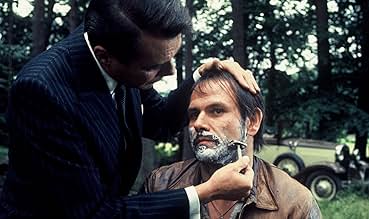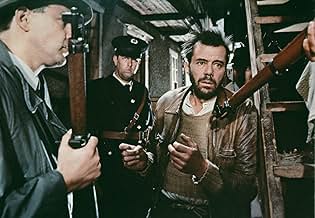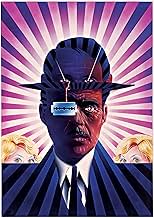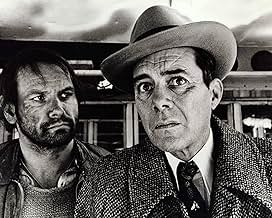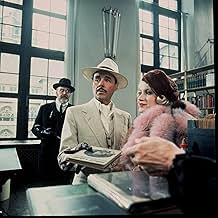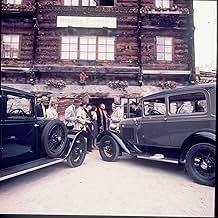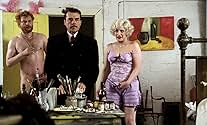Despair
- 1978
- 1 घं 59 मि
अपनी भाषा में प्लॉट जोड़ेंIn early-1930s Berlin, an elegant Russian émigré and eccentric chocolatier convinces himself that he has seen his doppelgänger, and hatches a murderous plan to trade his existence for an ent... सभी पढ़ेंIn early-1930s Berlin, an elegant Russian émigré and eccentric chocolatier convinces himself that he has seen his doppelgänger, and hatches a murderous plan to trade his existence for an entirely new one. Will he get over the deep despair?In early-1930s Berlin, an elegant Russian émigré and eccentric chocolatier convinces himself that he has seen his doppelgänger, and hatches a murderous plan to trade his existence for an entirely new one. Will he get over the deep despair?
- निर्देशक
- लेखक
- स्टार
- पुरस्कार
- 3 जीत और कुल 1 नामांकन
- Innkeeper
- (बिना क्रेडिट के)
फ़ीचर्ड समीक्षाएं
Vladimir Nabokov wrote his novel "Despair" as a spoof of Dostoyevsky's "Crime and Punishment." The script includes lines referring to Dostoyevsky and Arthur Conan Doyle. "Despair" the film falls short of achieving/adapting the greatness of Dostoevsky or Conan Doyle. It is possibly because for Nabokov and Fassbinder the mental state of Herman (Bogarde) is paramount than the tale itself.
The audience struggles to come to terms with a clean shaven Herman suddenly sporting an elegant moustache in between sequences. If it was a fake moustache, the audience is not prepared for it by Fassbinder. Or were scenes edited out in the final cut?
Fassbinder was evidently quite familiar with Nabokov. Nabokov wrote Lolita with a lead character named Humbert Humbert. Fassbinder extrapolates the idea in "Despair" (or was it Stoppard?) by calling the lead character in "Despair" Herman Hermann, when Nabokov called him just Herman.
If there was one outstanding aspect in this film it was cinematographer Michael Ballhaus working with mirrors and glass panes in doors. One great shot, creditable to Fassbinder and Ballhaus, was of two Jews continuing to play chess at the street cafe as a Jewish shop is attacked by Nazis followed much later in the film by a distinctly similar shot of the same Jewish duo playing chess with non-distinctive clothes.
Another important aspect of the film is Fassbinder 's dedication of this quaint work to three mentally unstable geniuses: Antonin Artaud (the actor/playwright who introduced The Theatre of Cruelty) , Vincent Van Gogh (the painter who cut off his ear) and Unica Zurn (a painter famous for her paintings of torsos bound with string). And lastly several actors in this film and those supposed to play originally in the film were openly gay as was the director..
Much of the film takes place inside Herman's stately bourgeois home. Shots of the characters through glass partitions keep the viewer at a distance and the elegant interiors look like an abandoned mausoleum. Lydia's and Herman's relationship is unconvincing and Fassbinder's repeated descriptions of Lydia as an unintelligent sex object border on misogyny. "The flowers of your sensuality would wilt with intelligence," Herman tells his wife whom he always addresses with condescension. In addition to Lydia, we gradually meet other vivid supporting characters: Lydia's cousin, Ardalion; and Dr. Orlovious, an insurance salesman whom Herman mistakenly thinks is a psychiatrist and opens up to.
Herman is convinced that Felix Weber (Klaus Lowitch), a laborer, resembles him as closely as "two drops of blood." though the resemblance is tentative at best (a joke Nabokov wisely saved for his readers until the end of his novella). He has an odd compulsion to observe himself as a stranger and devises a plan to commit the perfect crime, exchanging identities with the worker as a means of escaping his existence. Felix, on the other hand, decides to humor the eccentric Herman with the thought of getting a job. In Despair, Fassbinder constructs a world in the process of falling apart where people march inexorably toward self-destruction and where the journey into light proves to be an illusion. In a world approaching madness, however, Hermann seems to fit perfectly -- no more, no less crazy than the insanity occurring around him.
This was Fassbinders shot at 'commercialism', which he failed at entirely (thankfully) but we are left with a thoughtful examination of the boundaries between self awareness and delusion. A metaphor for post war Germany? Who am I to be so pretentious ...
Strong performances, provocative script, not a light romp but neither is it a heavy slog.
CC
क्या आपको पता है
- ट्रिवियाThis movie cost more than all of Director Rainer Werner Fassbinder's previous movies combined.
- गूफ़Though the movie is set in Weimar Germany in the early 1930s, at 1:15:15, Hermann Hermann smokes a filtered cigarette, and those were put on the market in the 1950s.
- भाव
Lydia: What's that accident all about?
Herman: What accident?
Lydia: In America. Why should it matter to you?
Herman: It doesn't say anything about an accident... it says just to go crash. Collapse!
Lydia: The whole street collapsed?
Herman: Wall Street.
Lydia: Were people killed?
Herman: Just a few. Mostly jumping out of windows. Nearly all of them were stock holders.
Lydia: Oh, Hermann...
Herman: Really, you are such a... such a stupid woman, Lydia. You've lived here for 7 years already and you still can't speak the language properly. Still, I don't mind. Inteligence would take the bloom off your carnality. No, a woman like you should keep moist and plump.
- कनेक्शनFeatured in Dirk Bogarde: By Myself (1992)
टॉप पसंद
- How long is Despair?Alexa द्वारा संचालित
विवरण
- रिलीज़ की तारीख़
- कंट्री ऑफ़ ओरिजिन
- भाषा
- इस रूप में भी जाना जाता है
- Desesperación
- फ़िल्माने की जगहें
- उत्पादन कंपनियां
- IMDbPro पर और कंपनी क्रेडिट देखें
बॉक्स ऑफ़िस
- बजट
- DEM 60,00,000(अनुमानित)
- US और कनाडा में सकल
- $8,144
- US और कनाडा में पहले सप्ताह में कुल कमाई
- $11,623
- 16 फ़र॰ 2003
- दुनिया भर में सकल
- $8,158
- चलने की अवधि1 घंटा 59 मिनट
- ध्वनि मिश्रण
- पक्ष अनुपात
- 1.66 : 1
इस पेज में योगदान दें



